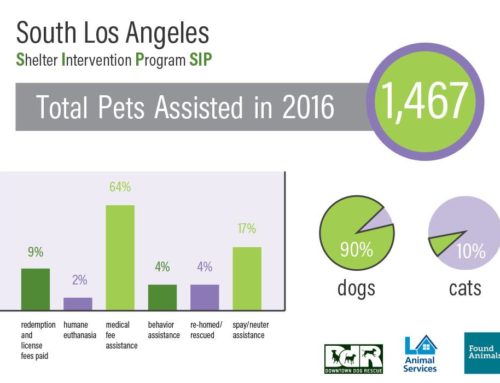 You’ve heard us say it many times before: What’s happening in our shelters isn’t a “pet problem” — it’s a poverty problem. There were many days when we felt like we were shouting it to no one, telling it to the walls. It’s human nature to get stuck looking at things one way, and we understand that. But we knew the approach had to shift, to look deeper, and we always believed if we just kept up our work, kept seeing the truth and sharing the truth, that eventually someone would see it for themselves. We did not expect that the great, big ASPCA could be that someone.
You’ve heard us say it many times before: What’s happening in our shelters isn’t a “pet problem” — it’s a poverty problem. There were many days when we felt like we were shouting it to no one, telling it to the walls. It’s human nature to get stuck looking at things one way, and we understand that. But we knew the approach had to shift, to look deeper, and we always believed if we just kept up our work, kept seeing the truth and sharing the truth, that eventually someone would see it for themselves. We did not expect that the great, big ASPCA could be that someone.
The ASPCA is in our corner and conducting a formal research project about this very topic. The ASPCA’s findings show, like ours have and continue to, that because people living at or below the poverty level might not be able to afford medical care to treat a pet’s issue (however small or large – or even simply spay/neuter), they often see turning their animal into the shelter as the only option. It’s a choice made out of necessity and in some cases kindness; not often out of carelessness. Their research also proves that given the opportunity to receive assistance and keep their pets at home, most families gratefully accept.
“… the shelter was often the first and only solution they sought for their pet, and more than 80% of those we surveyed were unaware that there might be support for them to retain their pet,” the article points out. “When the relinquishment group was given the choice of proceeding to the shelter after completing the survey or pursuing information about services that could help them keep their dog, 88% of them chose to pursue services. Yes—88%.”
We hope that these are the kind of hard facts that will dissolve judgment, and turn the wasted energy of blaming into the productive energy of extending a helping hand. We hope that these are the kind of hard facts that will keep many more animals out of the shelter, as we seek to do, because there comes a time in everyone’s life when a helping hand is a lifeline. It only takes a walk through the shelter kennels to see the need.
Furthermore, the ASPCA’s article states, “What we did find was a pattern of increased perceived stress in the relinquisher’s home, as well as emotional attachment to the dog—but an inability to provide the necessary care due to financial reasons and a lack of awareness of potential available resources. In plain speak, relinquishers loved their pets and saw relinquishment as the only solution available to them.”
Can you imagine caring about your pet so much that you leave them at the animal shelter because you want more for them? Can you imagine having no other options, or thinking there is no other way, and what it must feel like to walk out the door with your dog barking goodbye? What if instead a person could be given services, compassion, and in the end, walk out that same door leading a wagging tail back home? Time and time again, we’ve seen it’s not callousness most commonly causing people to leave their pets at a shelter; it’s hopelessness. We know this and we want to do something about it, and we are.
There is so much more we can do together. Strength in numbers has been our experience, and we’re grateful that the ASPCA is collecting the data alongside us. And we’re grateful for you. You’re our team. United, there is so much more we can do for shelter pets this year as we consider the people they came from.




